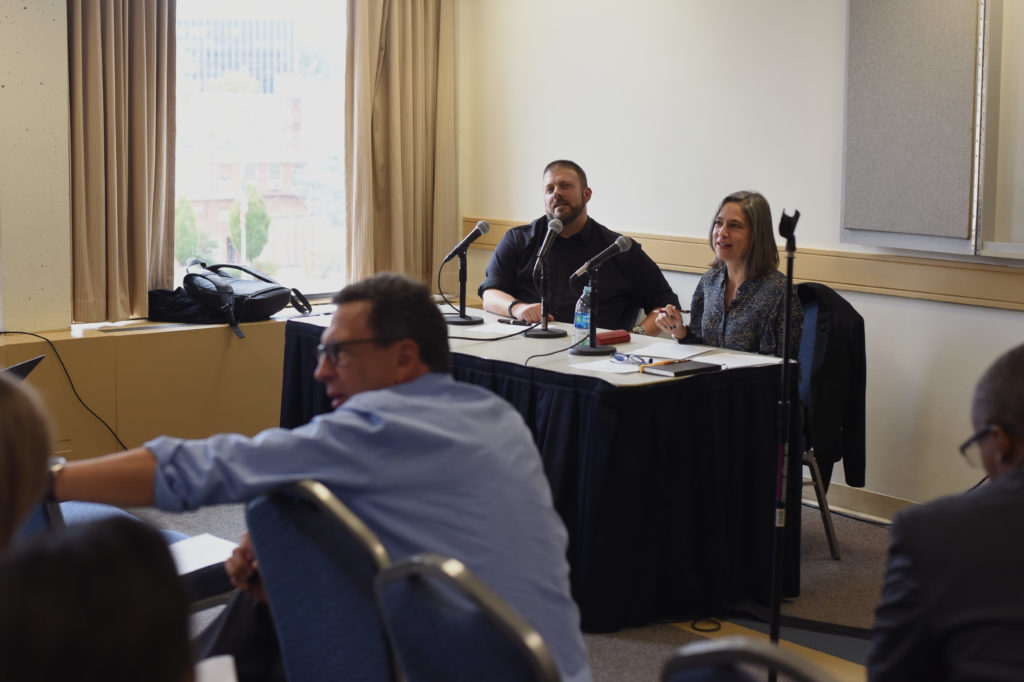Leaders of the committee overseeing undergraduate programs held a forum Tuesday for faculty and students to share their input on plans concerning undergraduate academics.
The forum, part of a series of public meetings officials are holding to gather feedback on the four pillars of the next strategic plan, featured an opening presentation by undergraduate education committee members about the need to hold a discussion about undergraduate academics followed by a question-and-answer session. Attendees discussed University President Thomas LeBlanc’s plan to cut enrollment while increasing the proportion of STEM majors.
Harald Griesshammer, a professor of physics, told the committee to “clearly spell out” how much money is needed to accomplish LeBlanc’s twin goals of decreasing enrollment by about 20 percent while increasing the ratio of STEM majors from 19 to 30 percent. He said members need to determine if officials will be able to maintain GW’s current racial and socioeconomic diversity levels despite a potential decrease in available financial aid resulting from the enrollment cut.
“We do not want to jeopardize the successes made in many aspects of diversity at GW,” he said.
Griesshammer said he is concerned about LeBlanc’s previous statements that GW’s budget will experience a $64 million shortfall over four years resulting from the two goals, adding that the figure represents the best possible scenario.
“Not only will we have the same amount of money for our plans – we will have less,” he said.
Joseph Cordes, a professor of economics and the chair of the Faculty Senate’s fiscal planning and budget committees, said at the meeting that he has suggested to members of the senate that any information provided to any of the strategic planning committees be made available to relevant senate committees that cover those topics.
He said officials must share information with members of the GW community not serving on the four strategic planning committees so members can better understand the committee’s responsibilities.
“It’s really got to be coordinated, and I hope the senate considers that a reasonable request and that the administration does too,” he said.
Cordes said he wants LeBlanc to make a final decision about which courses and departments are considered STEM because he said the president has changed his definition on multiple occasions. He said committee members should develop a concrete distinction in their recommendations.
“To the extent that that is still open for discussion, I think it would be worth posing,” Cordes said.
Reuben Brigety, the dean of the Elliott School of International Affairs, said the undergraduate curriculum should push students to learn more about the life of George Washington, the University’s namesake, drawing a parallel to how University of Virginia students learn about Thomas Jefferson by visiting his former home, Monticello.
“To my knowledge, we do not have a very active program in which all of our first-year students go to Mount Vernon as a means of understanding who George Washington was so they can understand who we’re supposed to be as an institution,” Brigety said.
Marcus Ware, the associate director of undergraduate advising in the Columbian College of Arts and Sciences and a member of the undergraduate committee, said CCAS offers a combined degree program that allows undergraduates to take graduate-level courses. He said officials should consider expanding this type of opportunity to more students to equip them with advanced skills and better prepare them for life after college.
Ware added that he has heard from advisers that students often discuss the desire to be challenged more in their coursework during advising appointments.
“We have a lot of conversations with students about ‘I’m thinking about transferring away from GW because other students at other schools are really given the ability to study the disciplines much earlier than they are at GW,’” Ware said.
Gayle Wald, the chair of the American studies department and the committee’s chair, said the committee will hold two town halls for undergraduate students next week to focus on receiving student input on the direction of undergraduate education.
She said officials charged the committee not with giving feedback on the parameters of the strategic planning process – whether to cut enrollment or not and whether to increase the ratio of STEM majors or not – but instead giving recommendations on how to reach these targets.
“There’s been robust discussion about the parameters of the strategic planning process, particularly around the undergraduate students in STEM and the decrease in the overall number of undergraduate students,” Wald said. “I’m happy to have that conversation.”
Cleo Hudson and Rachel Samuels contributed reporting.





